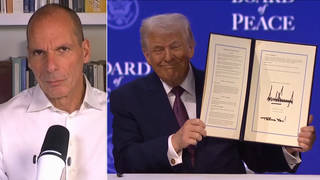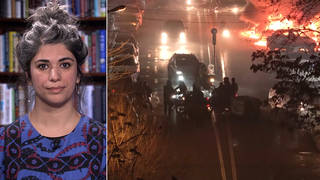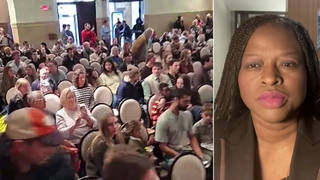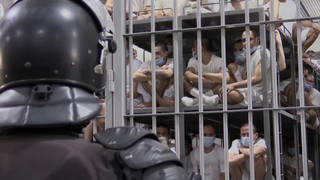
We look at how the assassination of Charlie Kirk has emerged as a tool for the Trump administration to crack down on dissent and free speech, as tens of thousands gathered Sunday in Arizona for a memorial for the conservative activist, including his wife Erika Kirk. While she called for forgiveness, President Trump and other top speakers, including Vice President JD Vance and White House Deputy Chief of Staff Stephen Miller, reiterated calls for revenge on political opponents. “It is not just rhetoric,” says Jameel Jaffer, director of the Knight First Amendment Institute at Columbia University. “The president really is using every lever at his disposal to silence, suppress and even imprison his political enemies.” Trump has also suggested that it should be illegal for journalists to cover his presidency in a negative light.
Transcript
AMY GOODMAN: This is Democracy Now!, democracynow.org, The War and Peace Report. I’m Amy Goodman.
We begin today’s show looking at the right wing’s weaponization of the horrific assassination of conservative activist Charlie Kirk, as tens of thousands of people gathered in Glendale, Arizona, Sunday for his memorial. Kirk was killed September 10th while speaking at Utah Valley University. His widow Erika delivered an emotional speech to the crowd at State Farm Stadium near Phoenix.
ERIKA KIRK: On the cross, our Savior said, “Father, forgive them, for they not know what they do.” That man, that young man, I forgive him.
AMY GOODMAN: Erika Kirk has just become the new head of the conservative group her husband co-founded, Turning Point USA. While she called for forgiveness for the assassin, President Trump and other top speakers, including Vice President JD Vance and White House Deputy Chief of Staff Stephen Miller, reiterated calls for revenge on political opponents. In his 40-minute eulogy, Trump hailed Kirk as a martyr and great American hero.
PRESIDENT DONALD TRUMP: He was a missionary with a noble spirit and a great, great purpose. He did not hate his opponents. He wanted the best for them. That’s where I disagreed with Charlie. I hate my opponent, and I don’t want the best for them.
AMY GOODMAN: While the Trump administration has threatened to target progressive groups in the aftermath of Kirk’s assassination, NBC reports authorities found, quote, “no evidence” tying the accused assassin to any left-wing groups.
As advocates continue to denounce Trump’s brazen attacks on free speech and the First Amendment, the president said Friday it should be illegal for journalists to give his administration negative coverage.
PRESIDENT DONALD TRUMP: I’m a very strong person for free speech. … The newscasts are against me. The stories are 90 — they said, 97% bad. So, they gave me 97. They’ll take a great story, and they’ll make it bad. See, I think that’s really illegal, personally.
AMY GOODMAN: “I think that’s illegal, personally,” President Trump said.
Trump’s comments come just days after ABC, owned by Disney, indefinitely suspended Jimmy Kimmel’s program, following the Chair of the Federal Communications Commission Brendan Carr’s threats to revoke the broadcast licenses of ABC affiliates. Carr recently told the right-wing podcaster Benny Johnson, quote, “We can do this the easy way or the hard way.”
BRENDAN CARR: You know, when you look at the conduct that has taken place by Jimmy Kimmel, it appears to be some of the sickest conduct possible. … I mean, look, we can do this the easy way or the hard way. These companies can find ways to change conduct, to take action, frankly, on Kimmel, or, you know, there’s going to be additional work for the FCC ahead.
AMY GOODMAN: For more, we’re joined in our New York studio by Jameel Jaffer, director of the Knight First Amendment Institute at Columbia University, previously deputy legal director at the ACLU.
Welcome back to Democracy Now!
JAMEEL JAFFER: Thanks, Amy.
AMY GOODMAN: It’s great to have you with us. If you can talk about what’s happening right now, first this statement of President Trump, which he has repeated now a few times, that it should be illegal for journalists to cover President Trump negatively?
JAMEEL JAFFER: Yeah.
AMY GOODMAN: He said they are breaking the law.
JAMEEL JAFFER: Yeah, I mean, let me start even before that by just stating the obvious. This killing of Charlie Kirk was a terrible, terrible thing, not just for Charlie Kirk’s family and his supporters, but for our society. It is a terrible thing when somebody is killed because of their political views, and our democracy won’t survive it if that becomes a pattern.
Now we see the Trump administration using the killing as a pretext to further a crackdown on free speech that started, you know, when President Trump took office in January. And this latest statement, the one you just mentioned, Amy, where the president says, essentially, “it’s illegal to criticize me,” I mean, is just really revealing what we have already seen through the president’s other policies. We have seen this wave of suppression directed not just at the media, but at universities, at cultural institutions, at law firms. Over and over again, the Trump administration latches on to whatever regulatory tools it has, and uses those tools as ways of silencing dissent, suppressing criticism. It is all flagrantly illegal.
And I think that, you know, President Trump saying “it’s illegal to criticize me” may get some Americans, who maybe haven’t been paying as close attention as they should have been to this wave of suppression, to realize what is really going on here. I mean, the president is claiming the powers of an authoritarian leader, and he’s doing it quite explicitly.
AMY GOODMAN: So, let’s talk about Jimmy Kimmel, Stephen Colbert before him, the significance of — I mean, this is also coming, to be clear — just I want to go to the backlash against Kimmel following his opening monologue days after Kirk’s assassination.
JIMMY KIMMEL: We hit some new lows over the weekend with the MAGA gang desperately trying to characterize this kid who murdered Charlie Kirk as anything other than one of them and doing everything they can to score political points from it.
AMY GOODMAN: The abrupt decision to indefinitely suspend Jimmy Kimmel Live! reportedly came from Robert Iger, the chief executive of ABC’s parent company, The Walt Disney Company, and Disney Entertainment Co-Chair Dana Walden. And this also comes in the midst of the hopes of a $6.2 billion merger between Nexstar, one of the biggest owners of ABC affiliates, and Tegna, which requires FCC approval, which is very significant —
JAMEEL JAFFER: Yeah.
AMY GOODMAN: — because that’s Brendan Carr saying, “We can do this easy way or the hard way.”
JAMEEL JAFFER: Yeah, I mean, I think you have to separate two things. So, the private media institutions have a First Amendment right to make the decisions they want to with respect to, you know, what content they show. That was true with Stephen Colbert, true with Jimmy Kimmel. It was true when Meta decided to deplatform President Trump. These private media organizations have a First Amendment right to make those decisions. But the idea is that they’re supposed to make those decisions autonomously and without undue pressure from the government.
But what we are seeing now is that all of these institutions, just like the universities, just like the law firms, just like the cultural institutions, are making these decisions with a kind of figurative gun to their heads. You know, the Trump administration is weaponizing regulatory authority. In this context, it’s the FCC’s power to approve mergers. With the universities, it’s Title VI of the civil rights laws. With the law firms, it’s security clearances. You know, they have different levers with different groups, but they’re using these levers in order to enforce a kind of ideological conformity.
AMY GOODMAN: I mean, the conservative pundits are continually saying, “Yes, this was just a business decision.” And Trump loves to say Colbert, Kimmel, you know, low ratings, their corporate heads have every right to fire them.
JAMEEL JAFFER: Yeah, yeah. I mean, I think that, you know, some of the conservatives who are saying, “This is just a business decision,” were not saying that when President Biden was leaning on the social media companies to change their policies with respect to vaccine misinformation. And President Biden’s actions, though I do think that they did step over the line, were much more respectful of this First Amendment line than President Trump’s decisions now.
President Trump is, you know, saying quite explicitly, “If you disagree with me, if you criticize me, you will be prosecuted.” And I don’t think we’ve had a president say something like that. I think this is the first time in the history of the modern First Amendment that — you know, that any president has suggested that it’s illegal to criticize him.
AMY GOODMAN: Now, I wanted to go to a day or two before Kimmel was let go, President Trump threatening ABC News, the same network —
JAMEEL JAFFER: Yeah.
AMY GOODMAN: — Jonathan Karl, after he questioned Trump about free speech and hate speech.
JONATHAN KARL: And what do you make of Pam Bondi saying she’s going to go after hate speech? Is that — I mean, a lot of people, a lot of your allies, say hate speech is free speech.
PRESIDENT DONALD TRUMP: Should probably go after people like you, because you treat me so unfairly. It’s hate. You have a lot of hate in your heart.
JONATHAN KARL: Would that be appropriate?
PRESIDENT DONALD TRUMP: Maybe they’ll come after ABC. Well, ABC paid me $16 million recently for a form of hate speech, right? Your company paid me $16 million for a form of hate speech, so maybe they’ll have to go after you.
AMY GOODMAN: So, why don’t you go to what the Attorney General Pam Bondi said about investigating hate speech, what Jonathan Karl was asking about, and then what President Trump said?
JAMEEL JAFFER: Yeah, I mean, I think — well, first of all, you know, the First Amendment protects hate speech. Part of the reason the First Amendment protects hate speech is that there has always been the fear about the ways in which government authority would use the power to suppress hate speech to go after legitimate political speech. And I think we’re seeing illustrated here why that fear is a very reasonable one. You know, President Trump is not really interested in suppressing hate speech as you or I might ordinarily think of it. What he’s interested in doing is suppressing speech that’s critical of him. And he has said this very explicitly.
And I worry that some people listen to this, and they think, “Oh, this is just rhetoric. It’s just President Trump going off.” But there are — you know, even as President Trump is saying these things, the Pentagon is now requiring — you know, as you reported, is now requiring journalists to sign a pledge that they won’t disclose information without approval, they won’t report without approval of the Defense Department. There are also foreign citizens whom the government imprisoned because of their political views. So, this is going on — you know, and, of course, there are universities that have been penalized because of their perceived liberalism. There are law firms that have been penalized because of their representation of clients the president doesn’t like. So it is not just rhetoric. The president really is using every lever at his disposal to silence, suppress and even imprison his political enemies.
AMY GOODMAN: This issue of the Pentagon, that we also raised in headlines, this is truly, I mean, astounding —
JAMEEL JAFFER: Yeah.
AMY GOODMAN: — that reporters cannot ask questions about or report on information on the Pentagon unless they sign a statement that they will have it preapproved?
JAMEEL JAFFER: Yeah, I mean, obviously, like, a reporter who is reporting only the things that the Pentagon wants them to report is doing something other than reporting, right? That’s not — that’s not what journalism is supposed to be. And I don’t think that journalists can, you know, agree to this and continue to do their jobs. You can’t — you can’t report only the things that the Defense Department approves.
AMY GOODMAN: So, on the issue of the divide right now in the country around free speech, it’s been interesting. I said conservative pundits were saying, but there are also so-called brocasters and conservative pundits and politicians who are actually raising a lot of concern —
JAMEEL JAFFER: Yeah.
AMY GOODMAN: — particularly afraid that if Democrats gain power, this will happen to them. For example, you have the Texas Senator Ted Cruz, who harshly criticized the FCC Chair Brendan Carr, accusing him of Mafia-like tactics, saying his threat to retaliate against media companies for speech on their airwaves is “dangerous as hell,” comparing it to Goodfellas. He said this is “right out of Goodfellas.”
JAMEEL JAFFER: Yeah, yeah. He’s right. And I think he’s also justified in worrying about what will happen when other people have this — you know, have this power. You know, that is one of the reasons that people who might not otherwise be committed to principle end up committed to principle, because they just know that whatever power this president is given might be used and abused by another president in the future in different — you know, in different ways. And we’ve seen that over and over again over the course of our — over the course of our history. And Ted Cruz isn’t the only one who — I saw that Ben Shapiro also made a similar observation. And I’m sure that, you know, both of them are coming at these issues from a very different place than I am, but, you know, I think that they’re — they’re right to be worried about the erosion of a principle that protects everybody.
AMY GOODMAN: I wanted to also ask you about the law that Governor Newsom, the California governor, just signed into law, called the secret police law. And this is the first law in the country to ban most law enforcement officers, including federal immigration agents, from covering their faces while conducting official business, under a bill that was signed —
JAMEEL JAFFER: Yeah.
AMY GOODMAN: — on Saturday. You have now Tricia McLaughlin, the spokesperson for the Department of Homeland Security, saying it’s supporting terrorists. You have the statement that the U.S. attorney should — has made that says you don’t have to follow this law. What does this mean?
JAMEEL JAFFER: Yeah, I mean, I haven’t studied the law, but I do think that ICE agents wearing masks is an invitation to abuse and impunity, and it’s very important that officers who are wielding the power of the state are identifiable to the rest of us. We need to know who they are, in order to be able to hold them accountable. And because you can hold them accountable if you know who they are, abuse is less likely. And, you know, I think that that is why, for the most of modern history, we have not had government agents walking around the United States wearing masks. We require them to show their faces, to have ID badges that show their numbers, you know, in part to deter abuse, and in part to ensure that we can hold people accountable if they do engage in — engage in abuse.
I would also just ask, like, if we accept this, if we accept ICE agents wearing masks, on the theory that they could be retaliated against if they show their identities, it’s not obvious to me why we would stop with ICE agents. Like, you know, soon we will have judges in masks, too, and government lawyers in masks. And I don’t think that, you know, any of that is consistent with democratic values.
AMY GOODMAN: Finally, can you comment on the judge dismissing the lawsuit against The New York Times, Trump’s lawsuit against New York Times? Very interesting. He just sued Murdoch at the same time he’s working a deal with him with Tiktok and China. But the significance of the judge saying the complaint of President Trump failed to contain a short and plain statement of the claim. Of course, Trump can appeal this decision.
JAMEEL JAFFER: Yeah.
AMY GOODMAN: What about why he sued The New York Times?
JAMEEL JAFFER: Well, I mean, I think that it is an extremely feeble complaint. It’s a complaint about totally legitimate journalism that The New York Times has done about President Trump, and this is just an effort to intimidate the Times and intimidate other media organizations. And I don’t think —
AMY GOODMAN: Suing them for $15 billion.
JAMEEL JAFFER: I mean, it’s an absurd —
AMY GOODMAN: Defamation suit.
JAMEEL JAFFER: You know, yeah, it’s an absurd lawsuit. But I think that, you know, the risk is that it will chill not so much The New York Times, but it’ll chill other media that don’t have the resources of the Times from aggressively reporting about the president and his allies.
AMY GOODMAN: Jameel Jaffer, thanks so much for being with us —
JAMEEL JAFFER: Thanks, Amy.
AMY GOODMAN: — director of the Knight First Amendment Institute at Columbia University, previously deputy legal director at the ACLU.
When we come back, in a historic move, Britain, Canada, Australia, Portugal recognize a Palestinian state. We’ll speak to the British member of Parliament Jeremy Corbyn, former Labour leader in Britain, about this decision. Then we’ll go to the Israeli peace activist Yonatan Zeigen, who lost his mother, Vivian Silver, in the Hamas attack, October 2023, one of thousands of Israelis who have called for the recognition of a Palestinian state. And in Ramallah, we’ll talk to Dr. Mustafa Barghouti, general secretary of the Palestinian National Initiative. Back in 20 seconds.
[break]
AMY GOODMAN: “There Is Power in a Union,” Billy Bragg, performing in our Democracy Now! studio.











Media Options